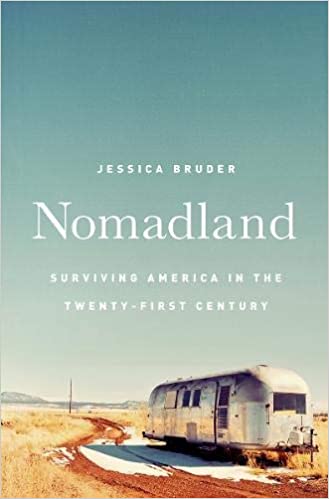Nomadland

Full Title: Nomadland: Surviving America in the Twenty-First Century
Author / Editor: Jessica Bruder
Publisher: W. W. Norton, 2017
Review © Metapsychology Vol. 25, No. 26
Reviewer: Bob Lane
First, the book has also been made into a film, directed by Chloe Zhao and starring Frances McDormand,“as a vandwelling working nomad who leaves her hometown after her husband dies and the sole industry closes down, to be “houseless” and travel around the United States.” Wikipedia reports: Nomadland is a 2020 American drama film based on the 2017 non-fiction book Nomadland: Surviving America in the Twenty-First Century by Jessica Bruder. The film is written, produced, directed, and edited by Chloé Zhao. It is easy to imagine it as a film. Especially with Frances McDormand in the starring role. (Read a movie review here: https://www.rogerebert.com/reviews/nomadland-movie-review-2020 – The result is a film that earns its emotions, which come from genuine, honest empathy more than anything else.)
Second, the book is a finalist for the J. Anthony Lukas book prize and the Helen Bernstein Book Award for Excellence in Journalism. Also a New York Times Editors’ Choice and a Library Journal top Ten book of 2017! And, trust this reader it is worthy of these awards.
Third, the author, Jessica Bruder, “is an award-winning journalist whose work focuses on subcultures and the dark corners of the economy. She has written for Harper’s Magazine, the New York Times, and the Washington Post. Bruder teaches at the Columbia School of Journalism.
Fourth, it is a great read.
What is it about? The book introduces the reader to a large group of people who live in their motorhomes year- round – first because they have lost their jobs and later because they come to endure the lifestyle. Many of them work for several weeks in various short term jobs like Amazon distribution centers, or at various campgrounds around the country, constantly on the move, meeting others in the same boat, checking the internet to determine if there are jobs available. “There’s no clear count of how many people live nomadically in America.” (49) And, “After the age of sixty has been reached, the transition from non-dependence to dependence is an easy stage – property gone, friends passed away or removed, relatives become few, ambition collapsed, only a few short years left to live . . .” and many then find a vehicle and hit the road. As Jacob S. Hacker writes: “Over the last generation, we have witnessed a massive transfer of economic risk from broad structures of insurance, including those sponsored by the corporate sector as well as by government, onto the fragile balance sheets of American families.” (66)
Bruder becomes one of the travellers, learning first-hand of their life and, as a good reporter, reports faithfully her experiences with the new to the road people who populate the pages of the book. One of those is Linda whose story is central to the book. “Beneath the fatigue, however, was a slow-dawning sense of pride. Linda had achieved a goal, getting through her first half-year as a workamper, completing two seasonal jobs – camp hosting and CamperForce – while acclimating to a frugal and nomadic life in her RV.” (113)
One such place is Quartsize. We learn this: “It’s estimated that more than forty thousand RVers dwell in the desert near Quartzsite from December through February.” “THE LONDON FINACIAL TIMES called Quartzsite “one of America’s more bizarre and seriously demented places.”” What about the people who are central to the book? First, they are lovable everyday Americans, most of whom have worked most of their lives and are suddenly the laid-off without work and without homes. As a result, they have hit the road. For example, LaVonne writes: “On her blog, The Complete Flake, described it as a transformative experience: I found my people: a ragtag bunch of misfits who surrounded me with love and acceptance. By misfits I don’t mean losers and dropouts. These were smart, compassionate, hard working Americans whose scales had been lifted from their eyes. After a lifetime of chasing the American Dream, they had come to the conclusion that it was all nothing but a big con.”
Each chapter tells the story of the people in their second hand motor homes or small vans and how they live while looking for part-time work – often at an Amazon warehouse filling orders or stacking boxes of stuff for delivery. Linda writes to the author: Radical I know, but this is what goes through my head when I’m at work. There is nothing in that warehouse of substance. It enslaved the buyers who use their credit to purchase that shit. Keeps them in jobs they hate to pay their debts. It is really depressing to be there. Linda, by the end of the book, has purchased a small piece of land and is going to be settled down on that land in a house.
Let me end with two quotes that give a sense of the book:
“The truth as I see it is that people can both struggle and remain upbeat simultaneously, through even the most soul-testing of challenges.” (164)
“America is the wealthiest nation on Earth, but its people are mainly poor, and poor Americans are urged to hate themselves . . . Every other nation has folk traditions of men who were poor but extremely wise and virtuous, and therefore more estimable than anyone with power and gold. No such tales are told by the American poor. They mock themselves and glorify their betters.” -Kurt Vonnegut, Slaughterhouse Five
This is a moving story, new to most of us, beautifully told, and worth your thought and consideration.
Bob Lane is a Philosophy Professor Emeritus at Vancouver Island University in Nanaimo. BC.
Categories: General
Keywords: cultural commentary
